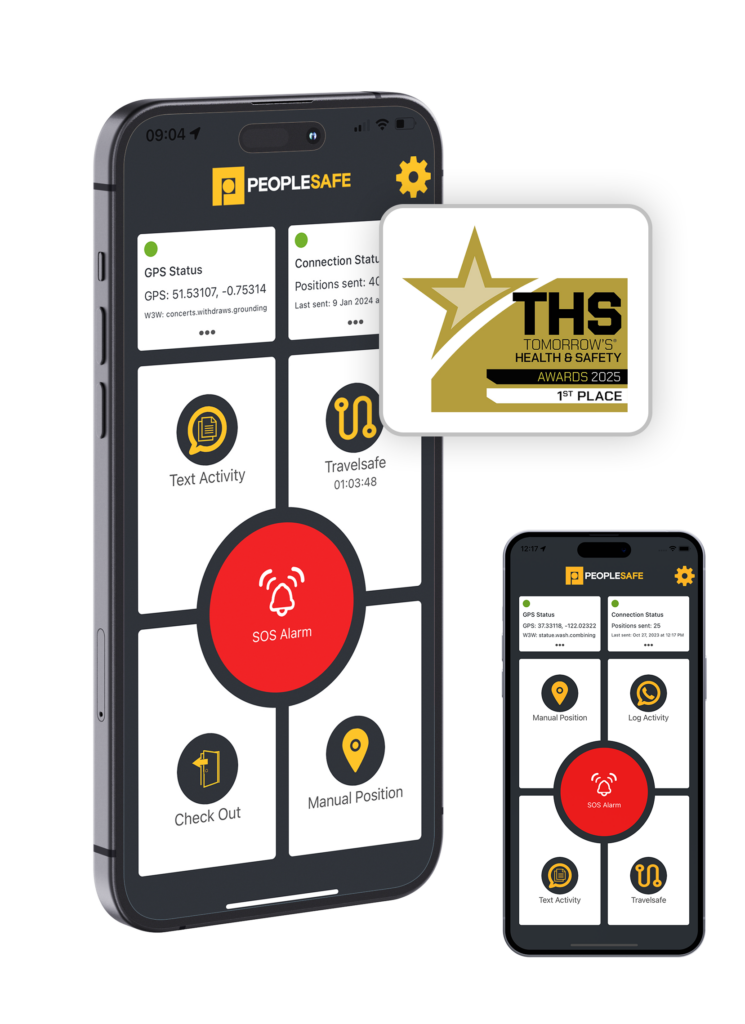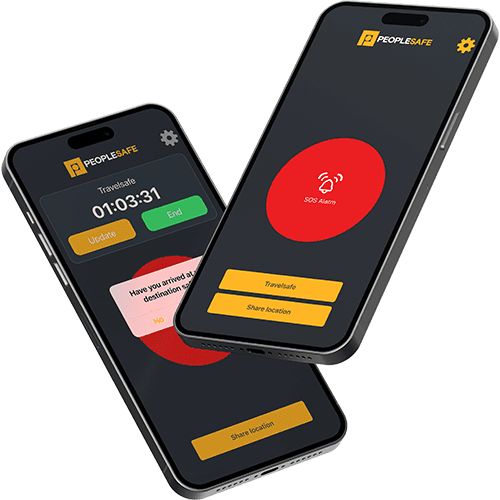Safe Travels, Happy Employees: Prioritising Wellbeing in Work-related Journeys
Travelling for work is still an integral part of employee’s lives despite the widespread cultural shift to remote working. Whether it’s travelling to the office, heading to a client meeting, or attending an industry event, journeys can have a significant impact on employee wellbeing.
For many, travelling for work can disrupt routines, introduce stress and pose new safety concerns. This not only impacts their wellbeing but can also affect their productivity and overall job satisfaction.
Our own research found that:
- 75% of workers have safety concerns when travelling for business.
- 69% of commuters have safety concerns about their journey, especially during unsociable hours.
- For 1 in 4, these safety concerns affect their work performance and wellbeing.
As this concern continues to grow and employers face mounting pressure to safeguard their employees, proactive measures are urgently needed to mitigate potential risks and ensure the safety and wellbeing of the workforce. Employers must prioritise safe travels for employees through safety protocols and fulfilling their duty of care.

The commute is an often-overlooked aspect of the employee experience. However, for many, it is a time filled with challenges, from traffic congestion and public transportation delays to personal safety concerns.
On average, the daily commute is around 52 minutes, which adds up to just over 4 hours a week for those commuting five days a week. For many employees, commuting during early mornings or late nights exacerbates safety concerns, leading to heightened feelings of vulnerability and stress.
But despite many of us assuming that travelling at peak times is safer, a survey by the British Transport Police (BTP) found that over a third of women have been sexually harassed on public transport. Alarmingly, most incidents occur during rush hour (5pm-7pm), despite the higher number of people around. This highlights the reality that a busy environment does not always equate to a safer one.
This fact leaves many employees feeling unsafe while commuting, no matter the time of day. This can significantly impact job satisfaction and overall wellbeing, leading to stress, increased fatigue, and lowered mood.
These feelings not only affect their mental health but also their performance and productivity at work. The psychological toll of a stressful commute can manifest in various ways, including increased absenteeism, lower job satisfaction, and a decline in overall workplace morale.
Concerns for Female Commuters
Deloitte’s Women @ Work report adds another layer of understanding to these challenges. According to Emma Codd, Global Chief Diversity, Equity, and Inclusion Officer at Deloitte, “Globally, women feel their rights are backsliding, they are experiencing increased stress […] they are experiencing non-inclusive behaviours at work, they are concerned for their safety” she added, “This is a situation that must change—and employers must enable this.”
Half of women say their stress levels are higher than they were a year ago and nearly half of women say they are worried about their safety when they are at work or travelling to or for work. These worries are substantiated by their experiences, with one in ten women reporting harassment while commuting or travelling for work, and 16% facing uncomfortable situations with customers or clients.
A Case Study on the Importance of Safe Travel Policies
As concerns for employee safety continue to grow, real-life examples highlight the critical need for employers to take action.
In a recent landmark case, Fathimath Athif sued her former boss after he repeatedly made her work past 11pm, forcing her to walk home alone late at night. A tribunal ruled in her favour and her boss was ordered to pay more than £16,000 in damages, finding Athif was indirectly discriminated against because of her gender.
The decision acknowledged that her safety concerns put her at a disadvantage compared to male colleagues, claiming Athif “was put at a disadvantage as she would have felt unsafe while she walked home after her shift, which would have caused her stress and anxiety,”.
This case underscores the critical need for employers to consider the safety implications of work schedules and commuting conditions, particularly for vulnerable employees.

How Travel Concerns Impact Business
When employees feel unsafe during their commutes, it doesn’t just affect them on a personal level; it has broader implications for the organisation. An unsafe and stressful journey to and from work can lead to:
- Decreased Productivity: Stress and anxiety can reduce an employee’s ability to concentrate and perform effectively.
- Higher Turnover Rates: Employees may seek other job opportunities with better commuting conditions or safe travel arrangements, leading to higher staff turnover.
- Increased Absenteeism: Fear of commuting can result in more sick days and unexplained absences.
- Lower Employee Engagement: Feeling unsafe can have a negative impact on an employee’s overall loyalty and commitment to the company.
- Poor Mental Health: Continuous exposure to unsafe commuting conditions can lead to chronic stress, anxiety, and other mental health issues.
Creating Safer Travel Experiences
Employers play a pivotal role in ensuring their employees experience safe travels while commuting. By proactively addressing the challenges and risks associated with commuting, employers can keep their employees physically safe, protect their mental health and show themselves as a responsible employer. Here are some ways to create safer travel experiences for employees.
1. Flexible Working Hours
Implementing flexible working hours can make employees feel significantly safer during commutes. By allowing employees to schedule their work hours to avoid peak commuting times or travel during daylight hours, employers reduce their exposure to unsafe conditions and allow employees to tailor their commuting times to support a healthier work-life balance.
2. Safe Travel Policies
Clear and comprehensive safe travel policies are essential for ensuring employee wellbeing during work-related journeys. These policies outline guidelines and procedures to mitigate potential risks. For example, providing guidance on using public transportation safely and encouraging employees to travel in pairs or groups when necessary. By establishing and communicating these policies effectively, employers demonstrate their commitment to protecting their employees and open a culture of communicating about these risks.
3. Safety Training
Employers can enhance their employees’ sense of security by implementing comprehensive safety training. Educating employees on personal safety measures and self-defence techniques can empower them during their commutes and provide a sense of peace of mind. This training can include sessions on travel safety, guides on best practices, and access to digital tools that assist them throughout their journey.
Additionally, working with organisations such as our partners, the Suzy Lamplugh Trust, for bystander intervention training can further equip employees to handle the harassment of themselves or others more effectively. Providing these resources not only enhances employee safety but also fosters a culture of care and support within the organisation.
4. Arrange Secure Transportation
Employers can support employee safety by arranging secure transportation options for off-site meetings and events. Providing reliable options such as taxis or car services ensures that employees have a safe means of transportation, especially during late hours. For instance, some companies, like law firms, offer taxi services for employees working late, recognising the importance of ensuring their staff’s security during commute times.
5. Provide Personal Safety Technology
Providing employees with personal safety technology is a proactive way to enhance employee safety and security during work-related travels. Solutions like the Peoplesafe SOS app offer users peace of mind by providing a discreet and easy way to access professional help 24/7.
Enterprise-level personal safety apps enable employees to access immediate assistance from dedicated alarm response centres at the touch of a button. If needed, the emergency services can then be contacted via URNs, bypassing 999 for the fastest response possible.
Additional features, such as Travelsafe, provide real-time support and additional reassurance for employees who feel unsafe on any journeys, inside or outside of work.
Travelsafe allows users to enter their start point, destination and how they’re travelling. The app then calculates how long the journey should take and generates an estimated time of arrival alongside a timed alarm. If they fail to reach their destination by the ETA, the alarm is activated.
Once activated, the alarm connects to the control centre, providing them with the user’s real-time location, a two-way audio channel and information from their personal profile. Expertly trained controllers then assess the situation and coordinate the appropriate response, contacting the emergency services and notifying pre-determined escalation contacts if necessary.
By integrating personal safety technologies into their existing safety protocols, employers empower their employees to take control of their personal safety and wellbeing, whether they’re commuting to the office or travelling for business.

The Benefits of Ensuring Safe Journeys
Ensuring safe travels for employees can have numerous benefits for both individuals and organisations. Firstly, prioritising employee safety enhances their overall wellbeing and peace of mind, reducing stress and anxiety associated with commuting. This creates a more positive work environment, leading to increased job satisfaction and improved employee morale.
For the business, investing in safe travel measures can result in improvements in productivity and performance. Employees who feel secure during their journeys are better able to focus on their tasks and deliver results effectively. By reducing the risk of accidents or incidents during travel, employers can also minimise absenteeism and turnover rates, ultimately saving time and resources associated with recruitment and training.
Beyond the immediate benefits, prioritising safe journeys enhances an organisation’s reputation and attractiveness as an employer. Demonstrating a commitment to employee safety not only helps in attracting top talent but can lead to positive word-of-mouth referrals and enhance the organisation’s brand image in the eyes of clients, partners, and stakeholders. The latest IHA Market Watch Report found that 82% of consumers said how brands treat employees impacts their purchase decisions. A Gallup study also found that companies with highly engaged employees have 20% more sales because their teams are more likely to go above and beyond to improve customer service. Ultimately, by investing in employee safety, companies not only foster a healthier and more productive workforce but also strengthen their market position and drive business.






